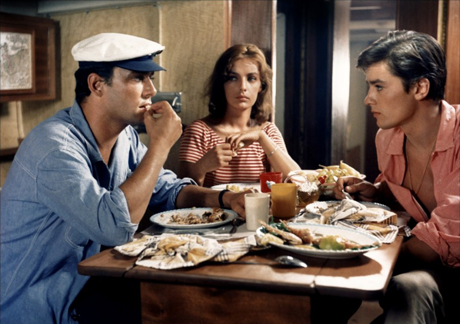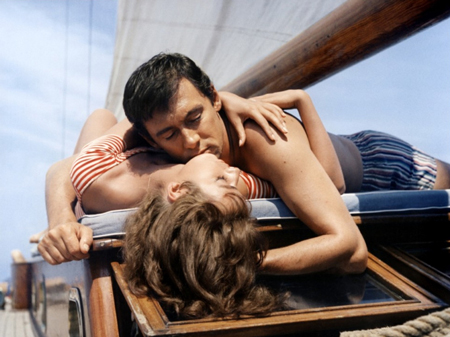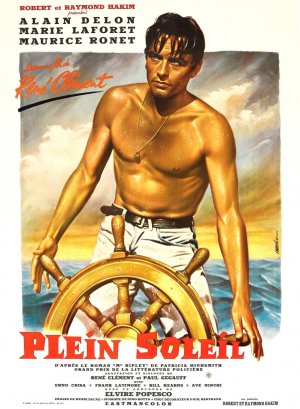
 |
|
|
|
Matt Damon fans probably remember 1999's The Talented Mr. Ripley. Most viewers are unaware that there's another picture based on the same Patricia Highsmith mystery novel -- a top-rank classic made 52 years ago in Italy by French director René Clément. Lovers of noirish fare will probably prefer this foreign original -- the plotting is coffin-tight and the actors include some excellent, unfamiliar faces. Purple Noon (Plein soleil) was also the star-making role for Gallic heartthrob Alain Delon. Patricia Highsmith had already been canonized by thriller fans as the original author of Alfred Hitchcock's 1951 Strangers on a Train. In 1960 Highsmith was still convinced that Hitchcock had been her best filmic interpreter, but Clément's take on Highsmith's "Ripley" character is perfect in its own way. 
We join a pair of Americans on the Italian coastline, where the good life never seems to end. Rich French-American Philippe Greenleaf (Maurice Ronet) refuses to come home despite his father's dispatching young Tom Ripley (Alain Delon) to fetch him for a $5,000 fee. Philippe is perfectly happy frittering away dad's money on a yacht and romancing his adoring fianceé, art enthusiast Marge Duval (Marie Laforet). With Tom in tow, Philippe spends his time getting drunk and carousing with other friends and acquaintances, much to the consternation of the faithful and forgiving Marge. Living on Philippe's nickel, the penniless Tom is an adept conman, having already convinced Philippe's father that he was an old friend. Philippe readily admits that his promises to return are empty -- Tom has no chance of earning his $5000. Although the bachelors joke about how easy it would be for Tom to kill his 'best pal' and take his place, Philippe has no idea of the schemes that are running through Tom's head. Purple Noon is a slick and accomplished mystery drama, beautifully put across in all departments. The leading players are excellent. Maurice Ronet is acceptable passing as an American, even though everyone speaks French and Italian. The swooningly attractive Marie Laforet comes off as intelligent and touching as the duped girlfriend. We're accustomed to seeing Alain Delon in his later films as a stoic icon, but here he shows us why 1960s critics thought him the French James Dean and the best new actor around. Delon seems born to play the slippery, wealth-obsessed Tom Ripley. The other characters note Tom's hungry attitude. In this atmosphere of privilege Marge knows something is not quite right. But Philippe is himself rather spoiled and self-obsessed, and Marge isn't sure which young man is taking advantage of the other. Director Clément builds a special kind of suspense that plays out in bright sunshine instead of noir shadows: deceit and intrigues need no longer hide in the dark. Wild impersonation gambits seldom seem credible in movies yet Tom's scheme works well here. Free of foolish coincidences, Purple Noon makes Tom Ripley's identity theft a simple matter of nerve and a few forgery skills. The other characters aren't morons. Philippe's best friend Freddy Miles (Billy Kearns) considers Tom a freeloading leech. But it matters not. With his special 'talent' for cold-blooded deception, all Tom needs to succeed is some diabolical luck. 
Henri Decaë's color photography is splendid. The beautiful Italian seaside turns the film into a travelogue to an Italy that no longer exists, a sunny paradise (for the well-heeled) free of hordes of tourists or commercialization. Thanks to René Clément's expert control we are almost immediately pulled into the tale. Even the difficult-to-film scenes on Philippe's sailboat seem unimpeded. It's more than possible that Purple Noon was a prime inspiration for Roman Polanski's first feature Knife in the Water made just three years later. Not a member of the French New Wave, Clément had made classics long before (La Bataille du rail, Forbidden Games) and rather good pictures afterward, such as the unjustly maligned Is Paris Burning? Unlike his trendy contemporary Roger Vadim, Clément's pictures come off as art and not commerce. I would put place him high in the ranks of French directors. The big neo-noir revival that began in the 1970s brought new attention to the contributions of mystery writers, which led to a reassessment of Patricia Highsmith's sophisticated mystery thrillers. Both Purple Noon and Strangers on a Train have at their center sociopathic 'heroes' that connect homoerotically with successful or wealthy men with whom they would desire to switch lives. In the 1999 remake The Talented Mr. Ripley it is but one factor in a more complicated framework that splits its attention between the thriller plot and the self-destructive Ripley character. The approach encouraged the stock convention of gay characters that become villainous psychos. In Purple Noon Tom Ripley's attraction to Philippe has been more or less dropped, sticking to the crime facts and leaving a clearer impression. Also, frankly, Matt Damon is no Alain Delon in the charm or looks departments. You believe Delon can keep his intelligent chums from becoming too suspicious. Damon's snide deceit is so obvious, a baby wouldn't take candy from him. 
Savant favorite Romy Schneider makes a brief cameo appearance in the first scene. Already firmly established, she was there because of a relationship with star Alain Delon that reportedly lasted decades through several marriages, and was a great source of sadness for her. All of which adds to our wish that the villain Tom Ripley will get his just desserts. His suave ruthlessness has us squirming in anticipation for just such a comeuppance. Patricia Highsmith was reportedly incensed that the filmmakers would not use her original ending. We can well imagine the show working her way, as well. Criterion's Blu-ray of Purple Noon is blessed with a beautiful transfer and is far superior to Miramax's flat-letterboxed 2002 disc. The warm colored azure coastline is such a paradise that we can well imagine why Tom Ripley would kill to assume Philippe Greenleaf's cushy lifestyle. According to poster ads, the film was released in Technicolor in the U.S. but in Eastmancolor in France as Plein Soleil. That title means 'full sun' and may have something to do with the bad sunburn Tom receives early in the film. Disc producer Susan Arosteguy assembles an impressive roster of extras. Author and scholar Denitza Bantcheva is interviewed on the subject of René Clément, and an old interview gives us the thoughts of Alain Delon. A 1971 interview piece on author Patricia Highsmith is fascinating, as the interesting woman is quite candid with her opinions and observations. An English-language trailer uses the alternate title The Talented Mr. Ripley. Nowhere in the movie is the significance of the English title Purple Noon explained. Criterion's insert booklet carries a very good essay by Geoffrey O'Brien and excerpts from a Clément interview conducted in 1981.
On a scale of Excellent, Good, Fair, and Poor,
Purple Noon Blu-ray rates:
Reviews on the Savant main site have additional credits information and are often updated and annotated with reader input and graphics. Also, don't forget the 2011 Savant Wish List. T'was Ever Thus.
Review Staff | About DVD Talk | Newsletter Subscribe | Join DVD Talk Forum |
| ||||||||||||||||||